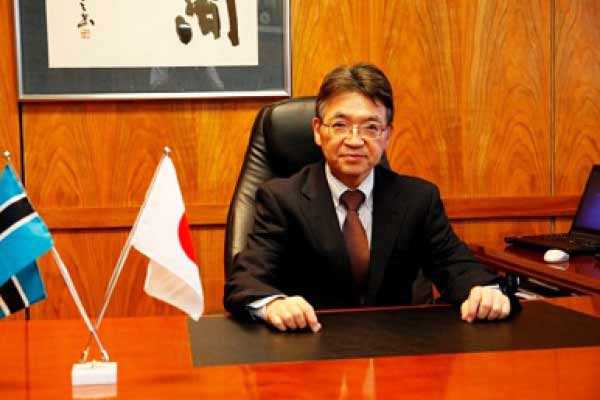Japanese envoy’s grand plan to increase bilateral trade
The volume of trade between Japan and Botswana remains very low despite the five decades of diplomatic relations between the two nations.
Japanese exports to Botswana – mainly automobiles and semiconductors – account for only 1, 3million Japanese Yen (JPY) while Japan’s imports from Botswana – mainly diamonds – account for 3, 3million JPY. “I intend to increase the volume of trade between the two countries, I am very worried that the level is so low,” Japan’s envoy to Botswana and a special representative to SADC Masahiro Onishi confided to Botswana Guardian in a meet and chat with the Editor and Chief Sub-Editor of the newspaper, Justice Kavahematui and Ernest Moloi respectively at his residence in Ext. 11, Gaborone.
Flanked by his lieutenants – Ako Yamamoto and Itsuroh Abe – both second secretaries at the embassy, the Ambassador waxed confidence that the task at hand was possible and can, with concerted effort from both sides, be attained even before the end of his tenure in one and half years’ time. Not only does Onishi intend to enhance trade relations, he is desirous of furthering the bonds of friendship that exist between the two peoples by consolidating existing cultural and educational exchange programmes.
Indeed Onishi has already flexed his muscles as he prepares to launch a charm offensive that will eventually grow the level of trade between the two nations beyond the traditional commodities to include coal mining, power generation, transport and communications, infrastructure development, port facilities and health and agriculture among other sectors.
The envoy showed his intent when he invited a Japanese business mission last month to visit Botswana to explore investment opportunities. The mission not only met the acting minister of trade Vincent Seretse, according to the Ambassador, but also Business Botswana as well as the executive secretary of the regional economic bloc SADC, Dr. Stergomena Lawrence Tax. The Ambassador says the visit was a “meaningful opportunity” for the company reps to explore possible areas of interest and cooperation. Some of the companies in the mission included Sojitz Corporation - a general trading company with a worldwide network of over 400 companies and operating in over 50 countries. It expressed “high hopes” that the visit to Botswana, a country well-endowed in natural resources, will facilitate the “creation of new business in the near future.”
There was also ITOCHU Corporation - a Japan based international trading and investment firm committed to the global good, which labours in Africa to contribute to regional economic and social development through its eleven local offices. ITOCHU made 1Mega Watt Photovoltaic power plant in Botswana under the Overseas Development Assistance (ODA) by Japanese Government.JGC Corporation was founded in 1928 as Japan’s first engineering contractor and provides services in the areas of engineering, procurement and construction as well as in enterprise investment. It expressed confidence that it could help Botswana grow by improving infrastructure in the areas of transportation, port facilities, power & water, mineral resources, LNG, coal mining, health care and agriculture.
The Ambassador expressed total delight at the prospect that a joint venture between Japan’s Marubeni and South Korea’s Posco Energy will later this year begin the expansion of Morupule B power station by another 300 MW and thereafter supply BPC with power over a 30-year period. Marubeni is a major Japanese trading conglomerate and project organizer that boasts 120 offices in 66 countries and is involved in wide-range of global trade and investment in energy, power, water, grain, petrochemical and industrial plants, and transportation equipment.
There was also Mizuho Financial Group and Sumitomo Africa Corporation according to the embassy’s first secretary Itsuroh Abe, who also doubles as a commercial attache and will be liaising with these companies to ensure that they finally set up shop in Botswana.
However, Japan’s relations with Botswana are not only confined to economic ties, but extend into the cultural and social spheres of life through, for example, the provision of technical assistance in various fields such as the digital migration project and provision of 500 educational TV programmes to Btv; the academic research project on Jatropha as an alternative source of energy; helping Botswana to map and monitor the amount forest resources she has; grant assistance to grassroots and training of Botswana’s civil servants by the Japan International Corporation Agency (JICA).
Abe points out that as a middle-income country (by UN standards), Botswana no longer qualifies to be given funds directly by its international cooperating partners hence the technical assistance that Japan provides the country to support its national economic development objectives. Botswana further enjoys support from Japan within the context of the Tokyo International Conference on African Development (TICAD), whose sixth summit is scheduled to take place in Africa this year.






